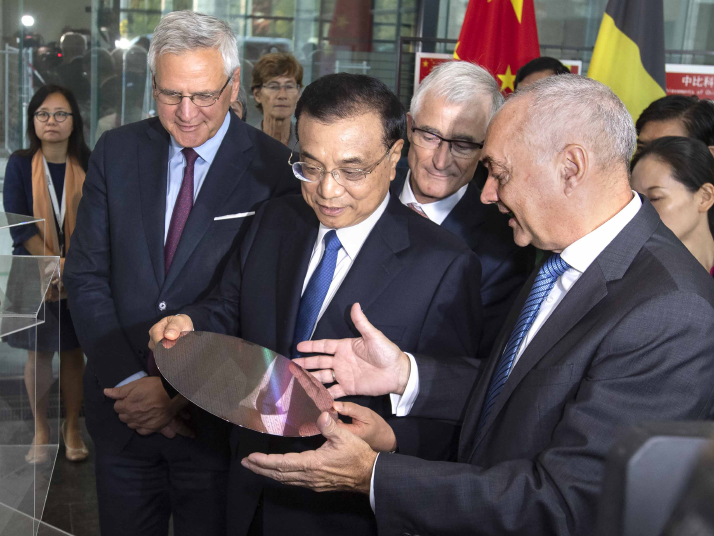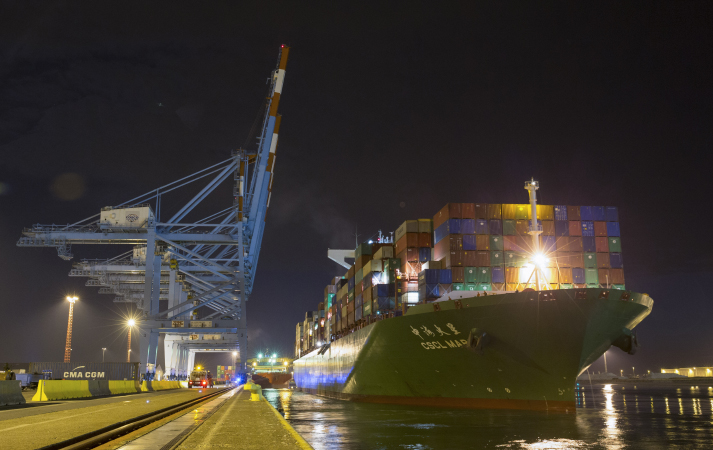| World |
| Common Prosperity | |
| Li Keqiang's Europe visit demonstrates China's firm stand on multilateralism | |
|
|
 Chinese Premier Li Keqiang (center), accompanied by Belgium's Deputy Prime Minister and Minister for Work, Economic Affairs and Consumer Affairs Kris Peeters (left), visits the Interuniversity Micro-Electronics Center in Leuven on October 18 (XINHUA)
The Port of Rotterdam, Europe's largest port and sitting on the junction of the land-based Silk Road Economic Belt and the 21st-Century Maritime Silk Road, is the first stop along half the deep-water freight shipping routes from China to Europe. Hence it is witness to growing economic ties between the two sides. Around 40 percent of Chinese goods are exported to Europe via the Netherlands. Every week, there are more than 90 round-trip flights between Amsterdam and seven Chinese cities. The China-Europe Railway Express has also expanded the range of solutions for logistics between the two countries, linking China with Tilburg, the second largest logistic hub in the Netherlands. Located at the intersection of the land and sea, the Netherlands has long been a gateway to Europe. In recent years, frequent high-level interactions between Beijing and Amsterdam have lent fresh impetus to bilateral relations, which are regarded as an open and pragmatic partnership for comprehensive cooperation. At the China-Netherlands Business Forum (CNBF) in The Hague on October 16, Chinese Premier Li Keqiang humorously demonstrated how the ties have grown. Instead of taking short steps to reach the rostrum, he arrived there in one stride. "This could be a demonstration of the renewed China-Netherlands ties, which have taken a stride, especially for our practical cooperation," he said in his speech at the forum. The official visit to the Netherlands was the first by a Chinese premier to the European country in 14 years. Besides the Netherlands, Li also made a trip to Brussels for a working visit to Belgium and attended the 12th Asia-Europe Meeting (ASEM) Summit. According to Cui Hongjian, a senior researcher with the China Institute of International Studies (CIIS), the premier's visit to the Netherlands and Belgium is a major diplomatic step taken by the Chinese Government to make new contributions to international cooperation and the healthy development of globalization despite the current complex international situation.  The container ship CSCL Mars berths at Zeebrugge Terminal, a new sea freight hub between China and Belgium, on October 15 (XINHUA)
Hi-tech cooperation Cooperation between China and the Netherlands enjoys a solid foundation. The Netherlands has been among China's top three trading partners in the EU since 2000. Two-way trade last year reached $78.7 billion and is expected to hit $90 billion this year. Each country has about $20 billion of investment in the other. Eleven out of the 15 Dutch Fortune 500 companies have invested in China, and the Netherlands is China's second largest investment destination in the EU. However, Li claimed that there is still considerable space for further expansion of bilateral cooperation as China-Netherlands trade only accounts for 1.5 percent of the combined trade volume of the two countries. When addressing the CNBF, the Chinese premier encouraged Dutch industries to actively participate in the first China International Import Expo which will be held in early November in Shanghai. "China is keen to import more manufactured industrial products, advanced equipment and quality agricultural produce from the Netherlands… We look forward to the active participation of Dutch companies to showcase your capabilities and I wish you hefty orders in advance," said Li. Ahead of the forum, under the witness of Li and Dutch Prime Minister Mark Rutte, enterprises of the two countries signed a series of agreements worth nearly $10 billion. Dutch energy storage and battery company Lithium Werks signed an agreement to invest $1.9 billion to build a battery gigafactory in China's Yangtze River Delta. The factory and related facilities, to be built on a 60-hectare site, will manufacture cells for lithium ion batteries. The facilities will have an installed production capacity of 500 GW per annum by 2030. The Netherlands, one of the first Western countries to have strategic and long-term scientific research cooperation with China, has great potential for cooperation in hi-tech, micro-electronics, aerospace and other innovative fields, said Jin Ling, another researcher on European studies with the CIIS, adding that with the Netherlands' unique geographical location, the entrepot will also boost China-Europe trade cooperation. Like the Netherlands, Belgium is also a renowned developed country in Europe and the first to achieve industrialization on the continent, Zhao Junjie, a researcher with the Chinese Academy of Social Sciences, said. As the political heart of Europe, Brussels hosts international organizations such as the EU and NATO. Belgium, though small in territory, has its own competitive advantages. Its domestic industries, such as biomedicine, energy conservation, nanometer electron and digital technology, are reputed worldwide. Due to this reputation, Li visited the Interuniversity Micro-Electronics Center (IMEC) during his trip. On being told a chip the size of a vinyl record could be one of the most advanced chips in the world, Li took off his glasses and looked at it closely. Comprehensive and multi-level scientific and technological cooperation is another bright spot in bilateral ties. Belgium has signed more than 70 technology-related cooperation agreements with China and 470 bilateral intergovernmental science and technology cooperation projects have been implemented since China's reform and opening up. Many Chinese companies such as Huawei and ZTE have signed cooperation agreements with IMEC and the Catholic University of Leuven on micro-electronics research and 5G development. Cao Zhongming, Chinese Ambassador to Belgium, said China and Belgium are cooperating in the areas where Belgium is strong such as the nuclear industry, aerospace technology, biomedicine, clean technology and resource recovery. An all-round partnership of friendship and cooperation has brought tangible benefits to the people of the two countries and will continue to do so, Cao said. Embracing multilateralism ASEM was established after the Cold War in the 1990s to foster dialogue and cooperation between Asia and Europe. In the past two decades, it has brought together leaders of 53 ASEM members and international organizations to enhance understanding and deepen friendship. While addressing the 12th ASEM Summit and in his meetings with European leaders, Li said China opposes protectionism and upholds the rule-based multilateral trading system. In a signed article published in the Paris-based Nouvelles D'Europe, Li wrote, with the world facing the headwinds of unilateralism and protectionism, the solution to the challenges lies in "making a stronger commitment to uphold multilateralism, free trade, economic globalization and an open world economy, and striving to sustain the hard-won global recovery with concrete and concerted efforts." Asia and Europe together account for 55 percent of global trade, 60 percent of global population, 65 percent of global GDP and 75 percent of global tourism. "What Europe and Asia agree together matters not only for the two of us, but for the entire world," Federica Mogherini, EU High Representative for Foreign Affairs and Security Policy, said at the summit's press conference. "Together we represent a real global power; together, we can make a real difference for the world." European Commission President Jean-Claude Juncker said as indispensable global forces, Europe and China "bear an important responsibility in upholding multilateralism." Both sides support multilateral negotiations to resolve issues, he said. When the interests of Asian and European countries are being challenged and threatened, all parties must show unprecedented solidarity and mutual trust, and jointly safeguard the global multilateral trade and investment system. They must maintain the stability and predictability of the global order, and voice strong support for multilateralism, Lan Jian, an associate researcher with the CIIS, said. In his speech at the forum, the Chinese premier also suggested aligning the Belt and Road Initiative with the development of all countries in Europe to boost connectivity and achieve common prosperity. The Belt and Road Initiative advocates linked development between Asia, Europe and Africa through connectivity. The China-proposed development blueprint has received a positive response from Europe. The European Commission and the European External Action Service, the EU's diplomatic service, jointly released Connecting Europe and Asia: The EU Strategy, Europe's plans to link its transport, energy and digital networks with Asia. Many European scholars and politicians believe the strategy is highly compatible with the Belt and Road Initiative and will provide a wide space for all parties in Europe and Asia to enhance connectivity. Copyedited by Sudeshna Sarkar Comments to mamm@bjreview.com |
|
||||||||||||||||||||||||||||||
|